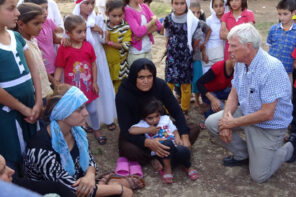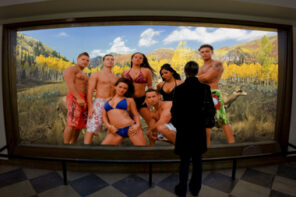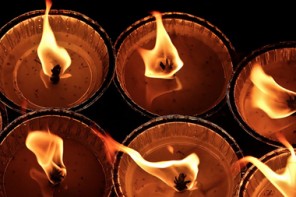Zeitoun
By Dave Eggers
McSweeney’s, 2009
Years from now, with the sterilizing benefit of distance, it might be easier to understand. Still, it will be an intense conversation: What happened to America? Who let it slide, who bankrupted it, and how did they get away with it for so long? Perhaps George Bush will have an unfairly exaggerated role in this inquisition, or at least the black hole of his presidency will: two terms that swallowed a couple of countries and a global economy before hope and change showed it the door.
But if there is a moment that should be an axis, a rupture before and after which harsher judgments could be made, it would be Katrina. This is what makes Zeitoun so memorable, so necessary, so unlikely. Dave Eggers painstakingly rebuilds New Orleans for us—that city where a presidency died and a planet changed its mind about us—and then smashes it before our eyes. He maps America onto an Arab, and makes the Arab the hero. Who else can do that?
This was not Kabul, not Kandahar or Baghdad, but one of the most storied American cities, abandoned to flood. For too many days, we could not muster any response to Katrina beyond impotent voyeurism. The inability—or the unwillingness—of the World’s Greatest Empire Since Rome to rescue its citizens (or, indeed, provide keys to FEMA trailers) left everyone, from inveterate America-bashers to Mike Myers, stunned and stuttering.
The contrast between the establishment and institutions that allegedly support and sustain us and a single man paddling his canoe to the rescue, underlines the worth of Eggers’ effort. His is a deep voice that has noticed more of that invincible rubber band that keeps America and Islam from ever moving too far from one another. (It is a weird intertwining, linking Afghan fighters knocking down the Soviet Union to the prejudicial rumors surrounding Barack Obama.)
But Zeitoun, as powerful, painful and wonderful as it is, is not intended for politics. It’s a great romance: Boy meets girl. Boy gets girl. It’s also trauma: Boy meets government. It is in the space of its pages a damn good narration, a constantly piercing and probing recollection of the tragedy of an upstanding man doing his civic duty (for which he was arrested, slammed to the dirt, and then dumped into prison with petty looters, rapists, and murderers). For all that, it has something to say about what happened to us. It sticks and succeeds because it upends everything. It comes down to the rightful revulsion we feel for a system which turns on a decent man and leaves him penned up in makeshift cages, under piercing white lights that could floodlight the sun. We see the best of America in an Arab, and the worst of America in the government.
Eggers takes us inside Abdulrahman Zeitoun (known to friends and family as “Zeitoun”), a charming can-do contractor-cum-entrepreneur who seems to know nothing but the dignity of work and the help of all. He is the American dream come true, an immigrant everyman who happens to have a funny name, a hero whose appearance and accent make him suspect, a lover of the sea who sees off his charming family to face down the hurricane. It is, unfortunately, in Zeitoun’s nature to be unafraid of nature. I cannot describe the punch of Eggers’ descriptions when, after Zeitoun watches the Hurricane pass, he wakes to a flood of crystal-clear water pouring down streets and into homes, the lake become the surface of the city. In that “mythical disaster,” Zeitoun finds his calling: With the use of a canoe, his skills, and his friends, he can liberate the trapped, feed starving pets, and re-supply the isolated. He is, in other words, the federal government we should have had.
That’s half of it—and don’t get me wrong, it’s done gorgeously. Eggers is so good at what he does, we forget that he is the medium between Zeitoun and our reading. We feel ourselves inside the story, for which reason it never loses its compelling momentum. But the still better half, the half that hurts long after the book is back on the shelf, is in the faith and romance that pull it all together, that take before and marry it to after, explaining why Zeitoun settled down and who it was who went sick worrying after him when he disappeared from New Orleans. It is the unlikely bond between a Syrian handyman and his wife, Kathy, a woman from suburban Louisiana, raised Southern Baptist but now wrapped in the kind of modest headscarf that makes the knees of European governments tremble. Their story, their delightful family, their love for and support for each other from the days leading up to Katrina to the rotten aftermath, are enough reason to want to keep reading. Their attempts to read their faith into their crises makes us need to keep reading; what Zeitoun thinks is divinely-gifted purpose might be no more than stubbornness. Where then does faithfulness bow to humility?
It is a rare storyteller who can bring his reader to individualize hitherto undifferentiated masses. This reviewer found especially moving, from a book that is uniformly and beautifully touching, Eggers’ narration of Kathy’s conversion to Islam. The author recedes; or perhaps he becomes his story. I have spent much of my life as an active, engaged Muslim, and I was taken by how gracefully and powerfully Eggers relates Kathy’s sentiments. Kathy came to Islam, she said, “comforted” by the “serious doubts of the Imams” she spoke to, attracted to the unassuming uncertainty “sewn into” the religion she eventually chose. That is an overdue insight to say the least, and yet another instance in which Zeitoun reaches far beyond its apparent boundaries: Gently upstaging the juvenile promotion of Islam as “simple,” which many Muslims are guilty of, reducing their religion to readily-available answers that bring to mind pre-fab IKEA furniture, assembled everywhere and found anywhere. (Below I will compare Islam to cotton candy.)
Eggers never stumbles when he introduces; between Zeitoun’s thoughts and fears, verses of Qur’an, episodes from his family history, instances from his childhood. We care about and root on the dry sidelines for the decent man overwhelmed by the skewed civilization around him, more interested in building prisons for its citizens than, say, finding them water, toilets, or evacuation options. You will be as afraid as Zeitoun, too, when he’s arrested on brittle pretext and thrown into New Orleans’ own Guantanamo Bay. His family, scattered from Arizona to Syria, comes together to recover him, but cannot patch up so easily. Not much solace comes from uniting around an absence. While Zeitoun does return, convinced he can rebuild and renew (in a concluding crescendo that will long be remembered), it seems he does not want—or cannot bring himself to conceive—that we cannot return to our uninjured selves merely by rebuilding the roofs over our heads. His shelter will never be so sturdy again.
I must say I’ve never read Eggers before this, and might have viewed early praise for Zeitoun with skepticism. I thought that this might be a portrayal of Islam that selects one of the two most common extremes. Either Islam is an improbable caricature, an evil that has somehow spread among hundreds of millions of people, or Islam is praised in such a manner as to make it as goofy and as gross in great quantity as cotton candy. This book is neither of these. It is its personalities but much more than them. It’s worth more than reading—it demands recommending, if not gifting, and a spell of pondering.
Zeitoun is underneath itself the chronicle of a time, the retelling of a government that let a city and then our country drown. We can fix bridges and buildings (at least we think we can), but I am not so clear on the damage we have done to ourselves. I cannot compass how that hurt spills forward through time, and how it might lead, in ways we do not yet know, to opportunities we will never have and challenges we will never overcome.
Sometimes an Arab has to disappear in order for us to see America.




